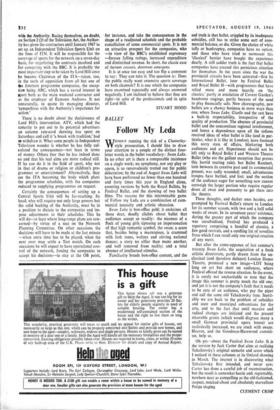Follow My Leda
BALLET
Swan Lake is box-office gold; it enshrines all those dear, deadly clichés about ballet that audiences accept so readily: the niceness of a flock of young girls tiptoeing an impersonation of that high romantic symbol, the swan; a score that, besides being a masterpiece, is crammed with lush tunes, waltzes and stirring national dances; a story no sillier than many another, and well removed from reality; and a total absence of intellectual stimulus.
Familiarity breeds box-office content, and the
sad truth is that ballet, crippled by its inadequate subsidies, still has to strike some sort of com- mercial balance, or die. Given the choice of white tulle or bankruptcy, companies have no option, and those who have tried to surmount this `classical' barrier have bought the experience dearly. A still sadder truth is the fact that ballet companies have created this pernicious situation for themselves. In the years since the war the provincial circuits have been saturated—first by International Ballet, later by Festival Ballet and Royal Ballet II—with programmes that have relied more and more heavily on 'the classics,' partly in emulation of Covent Garden's handsome stagings, partly because of the need to play financially safe. New choreography, new ballets are a chancy business in more ways than one, where Swan Lake, Giselle and the rest have a built-in respectability, irrespective of the quality of production. The absence of provincial ballet and the concomitant regional involvement, and hence a dependence- upon all the tedious received ideas of what ballet is like (and in par- ticular, what it is like in London), have fostered this sorry state of affairs, blinkering both audiences and art. Experiment should not be left only to Royal Ballet I and Western Theatre Ballet (who are the gallant exception that proves this horrid touring rule); but Ballet Rambert, torn between its creative past and its commercial present, was sadly wounded; small, adventurous troupes have battled, and lost; and the section of the audience eager for something new cannot outweigh the larger portion who require regular doses of swan and peasantry to get them into the theatre.
These thoughts, and darker ones besides, are prompted by Festival Ballet's return to London for its summer season, with two and a half solid weeks of swans. In its seventeen years' existence, during the greater part of which the company was unsubsidised, Festival has produced a repertory comprising a handful of classics, a few good revivals, and a curdling list of novelties from which I can recall only one original creation of any merit.
But after the come-uppance of last summer's travesty Swan Lake, the acquisition of a fresh artistic directorate, partly drawn from the un- classical (and therefore defunct) London Dance Theatre, promised a new image—LDT being long on art but short on audiences, where Festival offered the reverse situation. In the event, it is surely not uncharitable to note that the image this summer is pretty much the old one; and yet it is not the company's fault that it needs to be sure of an audience, who pay the piper and call the same old Tchaikovsky tune. Inevit- ably we are back to the problem of subsidies and state and municipal subventions for the arts, and to the fact that until massive and radical changes are initiated and the present miserable grants (which would disgrace many a small German provincial opera house) are realistically increased, we are stuck with swans. Heaven, and the Goodman-Harewood commit- tee, help us.
Oh yes—about the Festival Swan Lake. It is the version by Jack Carter that aims at realising Tchaikovsky's original scenario and score which I noticed in these columns at its Oxford showing in March. The interest is in discovering what Tchaikovsky first intended, and never saw; Carter has done a careful job of reconstruction, but the result is somewhat hectic and, regrettably, nowhere near as compelling as the old-fashioned, suspect, mucked-about and absolutely marvellous Petipa staging.
CLEMENT CRISP






























 Previous page
Previous page